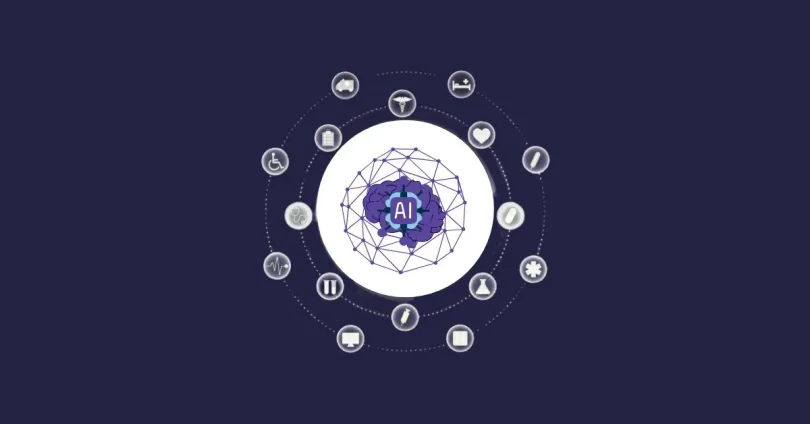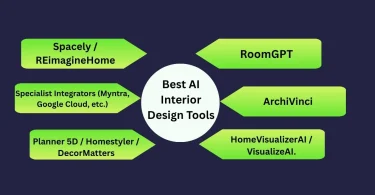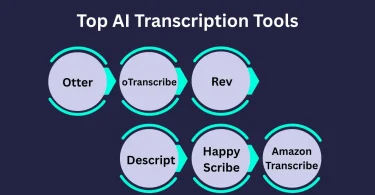AI is no longer a concept of the future in healthcare but a reality that is changing the healthcare industry in terms of delivery, management, and experience. By reaching 2025, AI is integrated into the clinical, operational, and administrative processes and enhance the quality of care and efficiency. From radiology to psychology, it is changing the face of healthcare in ways that are both functional and transformative.
How is AI currently being used?
Currently, organizations are applying artificial intelligence in automation, particularly in the areas of RPA and IA in the healthcare sector. These tools are mostly aimed at automating routine office tasks and data input, but as AI progresses, its uses do not stop.
AI excels at managing big data due to its ability to quickly and efficiently analyze vast amounts of information. This ability creates more possibilities, especially for the application of AI in the healthcare sector. Whether dealing with structured or unstructured data, it can interpret the information and deliver insights that support better decision-making. It also assists in integrating other systems, such as EHRs with other systems to ensure that the information is current.
However, it is also important to see how AI is being implemented in healthcare systems today before moving on to the future of AI in 2025.
The healthcare industry is under pressure due to long patient waiting lists, shortage of staff, and increasing patient expectations from the aging population. To address these challenges, they are adopting AI, automation, and orchestration in one solution called Enterprise AI.
Some current use cases
Revenue Cycle Management: For tasks like prior authorizations, organizations are using digital agents (enterprise bots) to reduce mistakes and speed up approval and payment timelines.
Patient Scheduling: AI-driven systems now allow self-scheduling, automatic reminders, and personalized updates to simplify the process.
Regulatory Compliance: Automation helps providers stay aligned with privacy laws, auditing standards, and real-time data tracking.
Clinical Coding: Converting patient health records into a format that can be easily analyzed in terms of codes can be time-consuming. This is made easier by AI as it can easily assign the right codes and ensure that records are updated.
These are some of the ways that AI and automation are changing the healthcare industry and enhancing the quality of care while increasing efficiency. You can read more about it in our IA and RPA case study based on the NHS in the U.K.
Key Applications of AI in Healthcare (2025)
AI is being used in different fields in healthcare to improve its functions and operations. Here are the major fields where AI is making a huge difference:
|
Application Area |
AI Use Cases |
|
Diagnostics and Imaging |
Machine learning tools help analyze medical imaging, enhancing the precision of diagnoses. |
|
Clinical Decision Support |
Artificial intelligence delivers instant analysis to support healthcare professionals in making well-informed choices. |
|
Administrative Automation |
Handles routine duties such as appointment setting and payment processing, easing the load on administrative staff. |
|
Mental Health Support |
AI-powered chatbots provide convenient and approachable assistance for mental health and overall well-being. |
|
Predictive Analytics |
Artificial intelligence forecasts health trends, helping healthcare providers develop preventative care strategies. |
|
Personalized Medicine |
Customizes medical care by analyzing each person’s genetic profile and daily habits. |
Market Growth and Adoption
AI adoption in healthcare has been growing rapidly in recent years. The current value of the AI healthcare market stands at $32.6 billion and is projected to grow to $188 billion by 2030, with an annual growth rate of 37%.
Currently, 94% of healthcare organizations claim to be using AI/machine learning in some way.
The AI healthcare market in the USA is expected to rise from $11.8 billion in 2023 to $102.2 billion in 2030, with a compound annual growth rate of 36.1%.
Top AI Innovations Transforming Healthcare in 2025
AI-Powered Diagnostics
AI algorithms are enhancing diagnostic processes by interpreting medical images with high accuracy.
For example, AI technologies can identify early indicators of conditions such as cancer, enabling prompt medical action.
Clinical Decision Support Systems
AI assists healthcare providers in diagnosing and treating patients by delivering real-time data insights. These systems use patient data to provide recommendations that are based on research, enhancing the quality of care.
Administrative Automation
AI automates tasks like scheduling appointments, invoicing, and record keeping, thus freeing up time for doctors to attend to their patients.
Mental Health Support via Chatbots
Woebot and Wysa are two AI-based chatbots that can help with mental health issues and offer coping mechanisms and emotional support, which is especially helpful given the scarcity of mental health specialists.
Predictive Analytics for Proactive Care
It analyses data to forecast health outcomes, including disease progression and hospital readmission risks, which can help allocate resources.
Personalized Medicine
AI integrates a patient’s genetic information with clinical data to enhance treatment effectiveness and reduce potential side effects.
Advantages and Challenges of AI in Healthcare
Advantages
The main goal of AI is to support, not replace, human professionals.
It saves time for doctors and nurses to attend to their patients’ physical and emotional needs.
AI can enhance screenings by analyzing X-rays and MRIs to identify problems that may not be visible to the naked eye.
Based on the patient history and the symptoms, it can determine the probability of the patient’s health status and suggest the necessary treatment. They also assess the efficacy of certain therapies through the analysis of other similar cases of patients.
From managing forms and clinical notes to sending appointment alerts and reserving surgery rooms, there are many mundane tasks that automation can handle for the staff.
Challenges
While AI offers numerous benefits, several challenges need addressing:
- Data Privacy and Security: The privacy of patient information is very important.
- Integration with Existing Systems: AI tools should be integrated into the current healthcare system to work in a seamless manner.
- Ethical Concerns: It is important to reduce biases in AI algorithms and provide equal treatment to all.
- Regulatory Compliance: Understanding and complying with healthcare regulations to ensure AI tools adhere to industry standards.
AI is transforming the healthcare sector in 2025 by providing solutions that improve patient outcomes, efficiency, and the work of healthcare workers. The future of technology is bright and as the world shifts towards the use of AI, it is important that it is adopted responsibly and in a manner that is ethical in the healthcare sector. AI technologies are making a difference in patient care and processes. The application of AI in such areas as precision medicine, mental health, and prognostics shows that it can transform care delivery. However, as we advance in this field, it is important to consider issues of data privacy, ethical issues, and integration of the system in the healthcare sector for the betterment of society.
FAQ about AI in Healthcare (2025)
AI is employed in various healthcare sectors, including diagnostics, treatment planning, administrative automation, and patient engagement. It aids in interpreting medical images, predicting patient outcomes, and managing routine tasks.
Major obstacles involve protecting patient data and maintaining security, aligning AI technologies with current healthcare systems, tackling ethical issues such as biased algorithms, and adhering to complex regulatory requirements.
While AI can augment healthcare services by handling data analysis and routine tasks, it is not a substitute for human professionals. The empathetic and nuanced care provided by healthcare workers remains irreplaceable.
AI is expected to become more embedded in healthcare, with developments in such areas as drug development, robotic surgery, and continuous patient tracking. The emphasis will be made on the creation of the AI solutions that are both ethical and secure and that can be easily integrated into clinical practice.



